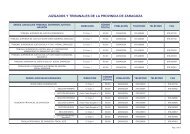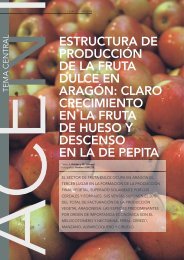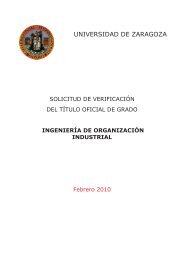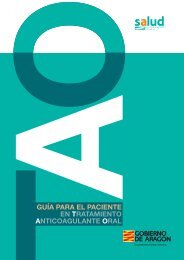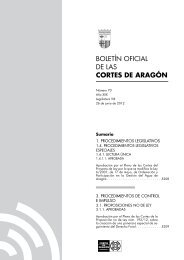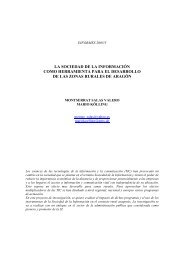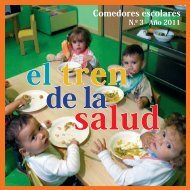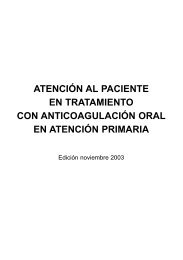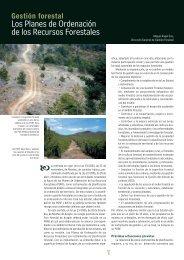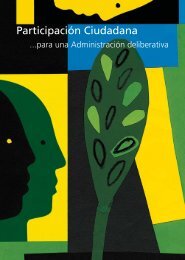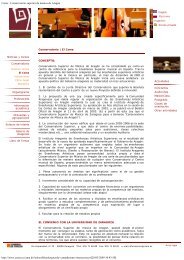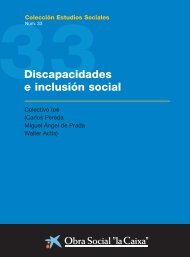- Page 1 and 2:
Informe de Seguimiento de la EPT en
- Page 3 and 4:
Educación para Todos EL IMPERATIVO
- Page 5 and 6:
Prefacio Tratar de lograr la Educac
- Page 7 and 8:
Agradecimientos El equipo que prepa
- Page 9 and 10:
Índice Mensajes principales . . .
- Page 11 and 12:
Lista de gráficos, cuadros y recua
- Page 13 and 14:
2.6: Distribución porcentual del e
- Page 15 and 16:
3.10: Relación entre las competenc
- Page 17 and 18:
Informe de Seguimiento de la Educac
- Page 19 and 20:
calidad para todos Un mejor aprendi
- Page 21 and 22:
Informe de Seguimiento de la Educac
- Page 23 and 24:
RESUMEN DEL INFORME / 23 Por últim
- Page 25 and 26:
RESUMEN DEL INFORME / 25 debido tie
- Page 27 and 28:
RESUMEN DEL INFORME / 27 Datos exac
- Page 29 and 30:
Informe de Seguimiento de la Educac
- Page 31 and 32:
ENTENDER QUÉ ES LA CALIDAD DE LA E
- Page 33 and 34:
ENTENDER QUÉ ES LA CALIDAD DE LA E
- Page 35 and 36:
ENTENDER QUÉ ES LA CALIDAD DE LA E
- Page 37 and 38:
ENTENDER QUÉ ES LA CALIDAD DE LA E
- Page 39 and 40:
ENTENDER QUÉ ES LA CALIDAD DE LA E
- Page 41 and 42:
ENTENDER QUÉ ES LA CALIDAD DE LA E
- Page 43 and 44:
Informe de Seguimiento de la Educac
- Page 45 and 46:
LA IMPORTANCIA DE LA CALIDAD: ENSE
- Page 47 and 48:
LA IMPORTANCIA DE LA CALIDAD: ENSE
- Page 49 and 50:
LA IMPORTANCIA DE LA CALIDAD: ENSE
- Page 51 and 52:
LA IMPORTANCIA DE LA CALIDAD: ENSE
- Page 53 and 54:
LA IMPORTANCIA DE LA CALIDAD: ENSE
- Page 55 and 56:
LA IMPORTANCIA DE LA CALIDAD: ENSE
- Page 57 and 58:
LA IMPORTANCIA DE LA CALIDAD: ENSE
- Page 59 and 60:
LA IMPORTANCIA DE LA CALIDAD: ENSE
- Page 61 and 62:
LA IMPORTANCIA DE LA CALIDAD: ENSE
- Page 63 and 64:
LA IMPORTANCIA DE LA CALIDAD: ENSE
- Page 65 and 66:
LA IMPORTANCIA DE LA CALIDAD: ENSE
- Page 67 and 68:
LA IMPORTANCIA DE LA CALIDAD: ENSE
- Page 69 and 70:
LA IMPORTANCIA DE LA CALIDAD: ENSE
- Page 71 and 72:
LA IMPORTANCIA DE LA CALIDAD: ENSE
- Page 73 and 74:
LA IMPORTANCIA DE LA CALIDAD: ENSE
- Page 75 and 76:
LA IMPORTANCIA DE LA CALIDAD: ENSE
- Page 77 and 78:
LA IMPORTANCIA DE LA CALIDAD: ENSE
- Page 79 and 80:
LA IMPORTANCIA DE LA CALIDAD: ENSE
- Page 81 and 82:
LA IMPORTANCIA DE LA CALIDAD: ENSE
- Page 83 and 84:
LA IMPORTANCIA DE LA CALIDAD: ENSE
- Page 85 and 86:
LA IMPORTANCIA DE LA CALIDAD: ENSE
- Page 87 and 88:
LA IMPORTANCIA DE LA CALIDAD: ENSE
- Page 89 and 90:
LA IMPORTANCIA DE LA CALIDAD: ENSE
- Page 91 and 92:
Informe de Seguimiento de la Educac
- Page 93 and 94:
EVALUACIÓN DE LOS PROGRESOS HACIA
- Page 95 and 96:
EVALUACIÓN DE LOS PROGRESOS HACIA
- Page 97 and 98:
EVALUACIÓN DE LOS PROGRESOS HACIA
- Page 99 and 100:
EVALUACIÓN DE LOS PROGRESOS HACIA
- Page 101 and 102:
EVALUACIÓN DE LOS PROGRESOS HACIA
- Page 103 and 104:
EVALUACIÓN DE LOS PROGRESOS HACIA
- Page 105 and 106:
EVALUACIÓN DE LOS PROGRESOS HACIA
- Page 107 and 108:
EVALUACIÓN DE LOS PROGRESOS HACIA
- Page 109 and 110:
EVALUACIÓN DE LOS PROGRESOS HACIA
- Page 111 and 112:
EVALUACIÓN DE LOS PROGRESOS HACIA
- Page 113 and 114:
EVALUACIÓN DE LOS PROGRESOS HACIA
- Page 115 and 116:
EVALUACIÓN DE LOS PROGRESOS HACIA
- Page 117 and 118:
EVALUACIÓN DE LOS PROGRESOS HACIA
- Page 119 and 120:
EVALUACIÓN DE LOS PROGRESOS HACIA
- Page 121 and 122:
EVALUACIÓN DE LOS PROGRESOS HACIA
- Page 123 and 124:
EVALUACIÓN DE LOS PROGRESOS HACIA
- Page 125 and 126:
EVALUACIÓN DE LOS PROGRESOS HACIA
- Page 127 and 128:
EVALUACIÓN DE LOS PROGRESOS HACIA
- Page 129 and 130:
EVALUACIÓN DE LOS PROGRESOS HACIA
- Page 131 and 132:
EVALUACIÓN DE LOS PROGRESOS HACIA
- Page 133 and 134:
EVALUACIÓN DE LOS PROGRESOS HACIA
- Page 135 and 136:
EVALUACIÓN DE LOS PROGRESOS HACIA
- Page 137 and 138:
EVALUACIÓN DE LOS PROGRESOS HACIA
- Page 139 and 140:
EVALUACIÓN DE LOS PROGRESOS HACIA
- Page 141 and 142:
EVALUACIÓN DE LOS PROGRESOS HACIA
- Page 143 and 144:
EVALUACIÓN DE LOS PROGRESOS HACIA
- Page 145 and 146:
EVALUACIÓN DE LOS PROGRESOS HACIA
- Page 147 and 148:
EVALUACIÓN DE LOS PROGRESOS HACIA
- Page 149 and 150:
EVALUACIÓN DE LOS PROGRESOS HACIA
- Page 151 and 152:
EVALUACIÓN DE LOS PROGRESOS HACIA
- Page 153 and 154:
EVALUACIÓN DE LOS PROGRESOS HACIA
- Page 155 and 156:
EVALUACIÓN DE LOS PROGRESOS HACIA
- Page 157 and 158:
EVALUACIÓN DE LOS PROGRESOS HACIA
- Page 159 and 160:
Informe de Seguimiento de la Educac
- Page 161 and 162:
POLÍTICAS PARA MEJORAR LA CALIDAD
- Page 163 and 164:
POLÍTICAS PARA MEJORAR LA CALIDAD
- Page 165 and 166:
POLÍTICAS PARA MEJORAR LA CALIDAD
- Page 167 and 168:
POLÍTICAS PARA MEJORAR LA CALIDAD
- Page 169 and 170:
POLÍTICAS PARA MEJORAR LA CALIDAD
- Page 171 and 172:
POLÍTICAS PARA MEJORAR LA CALIDAD
- Page 173 and 174:
POLÍTICAS PARA MEJORAR LA CALIDAD
- Page 175 and 176:
POLÍTICAS PARA MEJORAR LA CALIDAD
- Page 177 and 178:
POLÍTICAS PARA MEJORAR LA CALIDAD
- Page 179 and 180:
POLÍTICAS PARA MEJORAR LA CALIDAD
- Page 181 and 182:
POLÍTICAS PARA MEJORAR LA CALIDAD
- Page 183 and 184:
POLÍTICAS PARA MEJORAR LA CALIDAD
- Page 185 and 186:
POLÍTICAS PARA MEJORAR LA CALIDAD
- Page 187 and 188:
POLÍTICAS PARA MEJORAR LA CALIDAD
- Page 189 and 190:
POLÍTICAS PARA MEJORAR LA CALIDAD
- Page 191 and 192:
POLÍTICAS PARA MEJORAR LA CALIDAD
- Page 193 and 194:
POLÍTICAS PARA MEJORAR LA CALIDAD
- Page 195 and 196:
POLÍTICAS PARA MEJORAR LA CALIDAD
- Page 197 and 198:
POLÍTICAS PARA MEJORAR LA CALIDAD
- Page 199 and 200:
POLÍTICAS PARA MEJORAR LA CALIDAD
- Page 201 and 202:
POLÍTICAS PARA MEJORAR LA CALIDAD
- Page 203 and 204:
POLÍTICAS PARA MEJORAR LA CALIDAD
- Page 205 and 206:
POLÍTICAS PARA MEJORAR LA CALIDAD
- Page 207 and 208:
POLÍTICAS PARA MEJORAR LA CALIDAD
- Page 209 and 210:
Informe de Seguimiento de la Educac
- Page 211 and 212:
CUMPLIR NUESTROS COMPROMISOS INTERN
- Page 213 and 214:
CUMPLIR NUESTROS COMPROMISOS INTERN
- Page 215 and 216:
CUMPLIR NUESTROS COMPROMISOS INTERN
- Page 217 and 218:
CUMPLIR NUESTROS COMPROMISOS INTERN
- Page 219 and 220:
CUMPLIR NUESTROS COMPROMISOS INTERN
- Page 221 and 222:
CUMPLIR NUESTROS COMPROMISOS INTERN
- Page 223 and 224:
CUMPLIR NUESTROS COMPROMISOS INTERN
- Page 225 and 226:
CUMPLIR NUESTROS COMPROMISOS INTERN
- Page 227 and 228:
CUMPLIR NUESTROS COMPROMISOS INTERN
- Page 229 and 230:
CUMPLIR NUESTROS COMPROMISOS INTERN
- Page 231 and 232:
CUMPLIR NUESTROS COMPROMISOS INTERN
- Page 233 and 234:
CUMPLIR NUESTROS COMPROMISOS INTERN
- Page 235 and 236:
CUMPLIR NUESTROS COMPROMISOS INTERN
- Page 237 and 238:
CUMPLIR NUESTROS COMPROMISOS INTERN
- Page 239 and 240:
CUMPLIR NUESTROS COMPROMISOS INTERN
- Page 241 and 242:
CUMPLIR NUESTROS COMPROMISOS INTERN
- Page 243 and 244:
CUMPLIR NUESTROS COMPROMISOS INTERN
- Page 245 and 246:
CUMPLIR NUESTROS COMPROMISOS INTERN
- Page 247 and 248:
CUMPLIR NUESTROS COMPROMISOS INTERN
- Page 249 and 250:
Informe de Seguimiento de la Educac
- Page 251 and 252:
HACIA LA EDUCACIÓN PARA TODOS: EL
- Page 253 and 254:
HACIA LA EDUCACIÓN PARA TODOS: EL
- Page 255 and 256:
HACIA LA EDUCACIÓN PARA TODOS: EL
- Page 257 and 258:
HACIA LA EDUCACIÓN PARA TODOS: EL
- Page 259 and 260:
HACIA LA EDUCACIÓN PARA TODOS: EL
- Page 261 and 262:
Informe de Seguimiento de la Educac
- Page 263 and 264:
0 0 5 264 / ANEXO 2 Informe de Segu
- Page 265 and 266:
0 0 5 266 / ANEXO 2 Informe de Segu
- Page 267 and 268:
0 5 0 268 / ANEXO 2 Informe de Segu
- Page 269 and 270:
0 0 5 270 / ANEXO 2 Informe de Segu
- Page 271 and 272:
0 0 5 272 / ANEXO 2 Informe de Segu
- Page 273 and 274:
0 0 5 274 / ANEXO 2 Cuadro A1: El
- Page 275 and 276:
5 0 276 / ANEXO 0 2 Cuadro A2: Clas
- Page 277 and 278:
2 0 0 5 278 / ANEXO Informe de Segu
- Page 279 and 280:
0 0 2 5 280 / ANEXO Informe de Segu
- Page 281 and 282:
0 0 2 5 282 / ANEXO Informe de Segu
- Page 283 and 284:
5 0 284 / ANEXO 0 2 Años de refere
- Page 285 and 286:
2 0 0 Informe de Seguimiento de la
- Page 287 and 288:
5 0 0 2 288 / ANEXO Cuadro 1 (conti
- Page 289 and 290:
5 0 0 2 290 / ANEXO Cuadro 1 (conti
- Page 291 and 292:
5 0 0 2 292 / ANEXO Cuadro 1 (conti
- Page 293 and 294:
0 5 0 2 294 / ANEXO Cuadro 2 Alfabe
- Page 295 and 296:
5 0 296 / ANEXO 0 2 Informe de Segu
- Page 297 and 298:
5 0 298 / ANEXO 0 2 Informe de Segu
- Page 299 and 300:
5 0 300 / ANEXO 0 2 Informe de Segu
- Page 301 and 302:
5 0 0 2 302 / ANEXO Cuadro 3 Atenci
- Page 303 and 304:
5 0 304 / ANEXO 0 2 Informe de Segu
- Page 305 and 306:
0 0 5 306 / ANEXO 2 Informe de Segu
- Page 307 and 308:
5 2 0 0 Informe de Seguimiento de l
- Page 309 and 310:
5 0 0 2 310 / ANEXO Cuadro 4 Acceso
- Page 311 and 312:
5 0 312 / ANEXO 0 2 Informe de Segu
- Page 313 and 314:
0 5 314 / ANEXO 0 2 Informe de Segu
- Page 315 and 316:
5 0 316 / ANEXO 0 2 Informe de Segu
- Page 317 and 318:
0 0 2 5 318 / ANEXO Cuadro 5 Partic
- Page 319 and 320:
5 0 320 / ANEXO 0 2 Informe de Segu
- Page 321 and 322:
5 0 322 / ANEXO 0 2 Informe de Segu
- Page 323 and 324:
5 0 324 / ANEXO 0 2 Informe de Segu
- Page 325 and 326:
5 0 0 2 326 / ANEXO Cuadro 6 Eficac
- Page 327 and 328:
0 0 2 5 328 / ANEXO Cuadro 6 (conti
- Page 329 and 330:
5 0 0 2 330 / ANEXO Cuadro 6 (conti
- Page 331 and 332:
5 0 0 2 332 / ANEXO Cuadro 6 (conti
- Page 333 and 334:
0 334 / ANEXO 0 2 5 Cuadro 7. Efica
- Page 335 and 336:
5 0 336 / ANEXO 0 2 Cuadro 7 (conti
- Page 337 and 338:
0 5 338 / ANEXO 0 2 Cuadro 7 (conti
- Page 339 and 340:
5 0 340 / ANEXO 0 2 Cuadro 7 (conti
- Page 341 and 342:
0 5 0 342 / ANEXO 2 Cuadro 8. Parti
- Page 343 and 344:
2 0 0 Informe de Seguimiento de la
- Page 345 and 346:
2 0 0 Informe de Seguimiento de la
- Page 347 and 348:
5 2 0 0 Informe de Seguimiento de l
- Page 349 and 350:
0 0 5 2 350 / ANEXO Cuadro 9 Matric
- Page 351 and 352:
0 0 2 5 352 / ANEXO Cuadro 9 (conti
- Page 353 and 354:
0 0 5 2 354 / ANEXO Cuadro 9 (conti
- Page 355 and 356:
5 0 356 / ANEXO 0 2 Cuadro 9 (conti
- Page 357 and 358:
358 / ANEXO 0 5 0 2 Informe de Segu
- Page 359 and 360:
5 0 360 / ANEXO 0 2 Informe de Segu
- Page 361 and 362:
5 0 362 / ANEXO 0 2 Informe de Segu
- Page 363 and 364:
5 0 364 / ANEXO 0 2 Informe de Segu
- Page 365 and 366:
0 0 2 5 366 / ANEXO Cuadro 11. Ense
- Page 367 and 368:
5 0 368 / ANEXO 0 2 Cuadro 11 (cont
- Page 369 and 370:
5 0 370 / ANEXO 0 2 Informe de Segu
- Page 371 and 372:
5 0 372 / ANEXO 0 2 Informe de Segu
- Page 373 and 374:
5 0 374 / ANEXO 0 2 Informe de Segu
- Page 375 and 376:
5 0 376 / ANEXO 0 2 Informe de Segu
- Page 377 and 378:
378 / ANEXO 0 5 0 2 Cuadro 13A Pers
- Page 379 and 380:
5 0 380 / ANEXO 0 2 Informe de Segu
- Page 381 and 382:
5 0 382 / ANEXO 0 2 Informe de Segu
- Page 383 and 384:
Informe de Seguimiento de la Educac
- Page 385 and 386:
0 0 2 5 386 / ANEXO Cuadro 13B Pers
- Page 387 and 388:
5 0 388 / ANEXO 0 2 Cuadro 13B (con
- Page 389 and 390:
0 5 390 / ANEXO 0 2 Cuadro 13B (con
- Page 391 and 392:
5 0 392 / ANEXO 0 2 Cuadro 13B (con
- Page 393 and 394:
0 0 2 5 394 / ANEXO Cuadro 14. Esco
- Page 395 and 396:
5 0 396 / ANEXO 0 2 Informe de Segu
- Page 397 and 398:
0 5 398 / ANEXO 0 2 Informe de Segu
- Page 399 and 400:
5 0 400 / ANEXO 0 2 Informe de Segu
- Page 401 and 402:
2 0 0 Informe de Seguimiento de la
- Page 403 and 404:
5 0 404 / ANEXO 0 2 Cuadro 15 (cont
- Page 405 and 406: 5 0 406 / ANEXO 0 2 Cuadro 15 (cont
- Page 407 and 408: 5 0 408 / ANEXO 0 2 Cuadro 15 (cont
- Page 409 and 410: 0 0 2 5 410 / ANEXO Cuadro 16. Evol
- Page 411 and 412: 0 5 412 / ANEXO 0 2 Cuadro 16 (cont
- Page 413 and 414: 5 0 414 / ANEXO 0 2 Cuadro 16 (cont
- Page 415 and 416: 5 0 416 / ANEXO 0 2 Cuadro 16 (cont
- Page 417 and 418: 0 5 0 2 418 / ANEXO Cuadro 17. Evol
- Page 419 and 420: 5 0 420 / ANEXO 0 2 Informe de Segu
- Page 421 and 422: 5 0 422 / ANEXO 0 2 Informe de Segu
- Page 423 and 424: 5 0 424 / ANEXO 0 2 Informe de Segu
- Page 425 and 426: 2 0 Informe de Seguimiento de la Ed
- Page 427 and 428: 2 0 Informe de Seguimiento de la Ed
- Page 429 and 430: 2 0 Informe de Seguimiento de la Ed
- Page 431 and 432: 0 0 5 432 / ANEXO 2 Informe de Segu
- Page 433 and 434: 0 0 5 434 / ANEXO 2 Informe de Segu
- Page 435 and 436: 0 0 5 436 / ANEXO 2 Informe de Segu
- Page 437 and 438: 0 0 5 438 / ANEXO 2 Informe de Segu
- Page 439 and 440: 0 0 5 440 / ANEXO 2 Informe de Segu
- Page 441 and 442: 0 0 5 442 / ANEXO 2 Informe de Segu
- Page 443 and 444: 0 0 5 444 / ANEXO 2 Informe de Segu
- Page 445 and 446: 0 0 5 446 / ANEXO 2 Informe de Segu
- Page 447 and 448: 0 0 5 448 / ANEXO 2 Informe de Segu
- Page 449 and 450: 0 0 5 450 / ANEXO 2 Informe de Segu
- Page 451 and 452: 0 0 5 452 / ANEXO 2 Informe de Segu
- Page 453 and 454: 0 0 5 454 / ANEXO 2 Informe de Segu
- Page 455: 0 0 5 456 / ANEXO 2 Informe de Segu
- Page 459 and 460: 0 2 0 5 460 / ANEXO Informe de Segu
- Page 461: Educación para Todos EL IMPERATIVO



